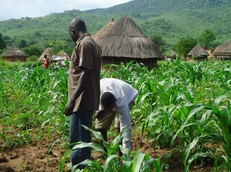
support@yorubalibrary.com
+2348073529208, 07038599574

Yoruba agricultural practices have been a cornerstone of the Yoruba people's sustenance and economy for centuries. Predominantly found in southwestern Nigeria, the Yoruba have developed a rich tradition of farming that integrates local knowledge, cultural practices, and sustainable methods. This article explores the key aspects of Yoruba agricultural practices, highlighting the crops they grow, the techniques they use, and the cultural significance of farming in Yoruba society.
Major Crops Grown by the Yoruba
Yams
Yams are a staple crop in Yoruba agriculture. They hold significant cultural importance and are often celebrated in festivals such as the New Yam Festival. Yams are grown in mounds, which help in soil aeration and moisture retention, leading to healthier tuber development.
Cassava
Cassava is another vital crop for the Yoruba. It is drought-resistant and can thrive in various soil types, making it a reliable food source. The roots are processed into various products like gari, fufu, and starch, which are essential in the Yoruba diet.
Maize
Maize, or corn, is widely cultivated and consumed. It is used in multiple forms, including fresh cobs, dried kernels, and processed into dishes such as pap (ogi) and cornmeal. Maize farming techniques among the Yoruba often involve intercropping with other crops to maximize land use and improve soil health.
Cocoa
Cocoa is an important cash crop, particularly in regions like Ondo and Ogun states. Yoruba farmers have traditionally engaged in cocoa farming, contributing significantly to Nigeria's cocoa production. The crop requires careful management, including regular pruning and pest control, to ensure high yields and quality beans.
Oil Palm
The oil palm is another significant crop, providing both food and economic benefits. Palm oil extracted from the fruit is a key ingredient in many Yoruba dishes, and the by-products are used for various purposes, including animal feed and biofuel.
Agricultural Techniques
Shifting Cultivation
Shifting cultivation, also known as slash-and-burn agriculture, is a traditional method used by Yoruba farmers. This technique involves clearing a piece of forest land by burning the vegetation, which adds nutrients to the soil. Crops are planted for a few years until the soil's fertility diminishes, after which the land is left fallow to regenerate.
Intercropping
Intercropping is a common practice where multiple crops are grown together on the same plot. This method optimizes land use, controls pests and diseases, and enhances soil fertility. For example, maize is often intercropped with beans or vegetables, which improves nitrogen levels in the soil and supports healthy crop growth.
Mixed Farming
Yoruba farmers frequently engage in mixed farming, combining crop cultivation with livestock rearing. This practice ensures a diversified food supply and provides manure for fertilizing crops. Common livestock include goats, sheep, and poultry, which are integrated into the farming system to enhance productivity.
Use of Traditional Tools
Traditional tools such as hoes, cutlasses, and digging sticks are widely used in Yoruba agriculture. These tools are effective for small-scale farming and are well-suited to the local environment. The use of traditional tools allows for precise and careful management of crops, which is essential for maintaining soil health and ensuring good yields.
Cultural Significance of Agriculture
Festivals and Rituals
Agriculture is deeply embedded in Yoruba culture, with numerous festivals and rituals celebrating various aspects of farming. The New Yam Festival, for example, marks the harvest of yams and includes rituals to thank the gods and ancestors for a bountiful harvest. Such festivals reinforce community bonds and cultural identity.
Oral Traditions and Proverbs
Yoruba oral traditions and proverbs often reflect the importance of agriculture. Proverbs like "A ki i je egun m'oyan" (One does not bleed and yam together) highlight the cultural value placed on farming and its products. These sayings encapsulate the wisdom and experiences of generations of Yoruba farmers.
Gender Roles in Agriculture
Both men and women play crucial roles in Yoruba agriculture. Men typically handle the clearing of land and planting of major crops, while women are involved in weeding, harvesting, and processing agricultural products. This division of labor ensures the efficient management of agricultural activities and supports the overall productivity of the community.
Modern Developments and Challenges
Adoption of Modern Techniques
In recent years, there has been a gradual adoption of modern agricultural techniques among Yoruba farmers. These include the use of improved seed varieties, chemical fertilizers, and mechanized tools. Such advancements aim to increase productivity and ensure food security in the face of growing population pressures.
Environmental Challenges
Yoruba agriculture faces several environmental challenges, including soil erosion, deforestation, and climate change. These issues threaten the sustainability of traditional farming practices. Efforts are being made to promote sustainable agricultural practices, such as agroforestry and conservation agriculture, to mitigate these challenges.
Economic Pressures
The economic landscape of Yoruba agriculture is changing, with increasing pressure to shift from subsistence to commercial farming. This transition requires access to capital, markets, and training, which can be challenging for small-scale farmers. Support from government and non-governmental organizations is crucial to facilitate this transition and ensure the economic viability of Yoruba farming communities.
Conclusion
Yoruba agricultural practices are a testament to the ingenuity and resilience of the Yoruba people. Through a combination of traditional methods and modern advancements, Yoruba farmers continue to sustain their communities and preserve their cultural heritage. Understanding and supporting these practices is essential for promoting sustainable agriculture and ensuring food security in the region.

Learn about the Yoruba concept of Ìwà Pẹ̀lẹ́ (good…

Learn special praises for Divine Being and Creator…